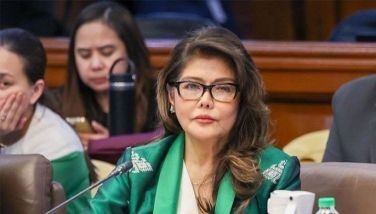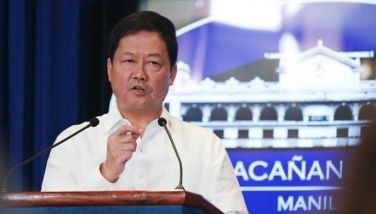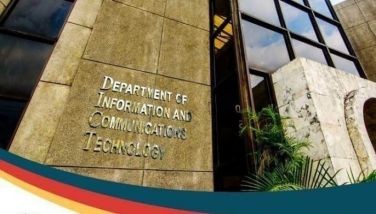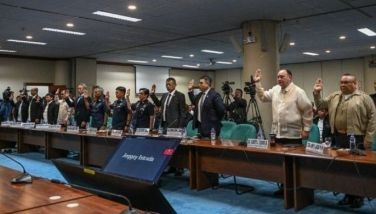‘Ex-VP Pelaez a pillar of strength’
July 29, 2003 | 12:00am
CAGAYAN DE ORO CITY — The late former Vice President Emmanuel Pelaez was a "pillar of Mindanao strength," Sen. Aquilino Pimentel Jr. said yesterday.
Pelaez, the first Mindanao politician to hold the second highest post in government, died of cardiac arrest Sunday night at the Asian Hospital in Alabang, Muntinlupa City. He was 87.
The cause of his death was a complication of a major stroke he suffered last April. He had been combating the effects of multiple mild strokes over the past two years.
Pelaez is survived by his wife, Edith Fabella, and their nine children.
His daughter, Berry Pelaez-Marfori, said her father’s remains will be cremated on Saturday. Necrological services will be held at the Senate on Thursday.
Pelaez had served in various capacities as ambassador, peace negotiator, congressman and senator. His last major stint was as ambassador to the United States under the Aquino administration.
He survived an assassination attempt in 1982, shortly after he led copra traders in opposing the monopoly of the United Coconut Oil Mills on the local coconut industry during the Marcos regime.
Immediately after he was attacked by assassins, the still conscious Pelaez expressed his deep dismay over this turn of events by telling then Quezon City police chief Gen. Tomas Karingal, "What is happening to our country, general?" This quotation has since been repeated time and again by others as a plea against the abuse of power and the reign of lawlessness.
Pelaez was elected representative of Misamis Oriental for two terms. He was elected senator and served as vice president to then President Diosdado Macapagal, the father of President Arroyo, from 1961 to 1965.
Pimentel, another Mindanao politician who once served as mayor of Cagayan de Oro City, said "Mindanao lost a pillar of strength and decency in the death of Maning Pelaez."
"He was also a visionary. He had espoused local autonomy while I was still cutting my teeth in political science in school," said Pimentel, the acknowledged father the Local Government Code of 1991.
He described Pelaez as "articulate and credible in his espousal of the causes of Mindanao development." One of the causes Pelaez pushed for was rural electrification to "give light to the tens of thousands of lightless homes in our part of the country."
Pimentel said Pelaez "was the most decent political personality ever to grace the electoral landscape of the country. Even as warlordism was in vogue in many parts of the republic, Maning never engaged in strong-arm tactics to gain political mileage."
Incumbent Vice President Teofisto Guingona, another native of Mindanao, expressed sadness over Pelaez’s death, pointing out how Pelaez "brought honor and distinction to the second office in the land" when he served as vice president.
"We have lost a statesman who will also be long remembered for his selfless and principled service in both the Senate and the House of Representatives and for passionately championing the cause of peace and the welfare of our coconut farmers."
After Pelaez, Guingona is the second Mindanao politician to hold the post of vice president.
Pelaez was born in Medina, Misamis Oriental on Nov. 30, 1915 to Gregorio Pelaez Sr. and Felipa Neri. He graduated valedictorian at Cagayan de Oro Elementary School and received highest honors at the Ateneo de Manila high school.
He obtained as Associate of Arts degree in Cebu at UP Junior College, earned a law degree at the University of the Philippines in 1938 and topped the bar examinations.
Pelaez was known for enacting three laws that would change the face of the countryside. The Barrio Charter, a precursor of the Local Government Code, gave the people the right to elect their barangay captain and to retain a percentage of their tax collection. Previous to this, barangay captains, then called barrio captains, were appointed by the municipal mayor.
The Agricultural Tenancy Act laid part of the groundwork for the adoption of the Comprehensive Agrarian Reform Law in the 1980s. The act served to curb the power of the landlord by clearly stipulating the tenants’ shares of the earnings.
The Total Electrification Act created rural electric cooperatives that wrested responsibility for the electrification of the countryside from local entrepreneurs and put in the hands of those who would benefit most from it. In the 1990s, Pelaez continued his crusade for rural electrification by heading the National Electrification Administration.
When Pelaez was chosen by then President Corazon Aquino to be the Philippine ambassador to the US, he distinguished himself by reinforcing the legitimacy of the Aquino administration with the US government. He also facilitated and assisted in the design of the Philippine Assistance Program, a US-led plan to prime development in the country through the massive infusion of aid money.
Pelaez, the first Mindanao politician to hold the second highest post in government, died of cardiac arrest Sunday night at the Asian Hospital in Alabang, Muntinlupa City. He was 87.
The cause of his death was a complication of a major stroke he suffered last April. He had been combating the effects of multiple mild strokes over the past two years.
Pelaez is survived by his wife, Edith Fabella, and their nine children.
His daughter, Berry Pelaez-Marfori, said her father’s remains will be cremated on Saturday. Necrological services will be held at the Senate on Thursday.
Pelaez had served in various capacities as ambassador, peace negotiator, congressman and senator. His last major stint was as ambassador to the United States under the Aquino administration.
He survived an assassination attempt in 1982, shortly after he led copra traders in opposing the monopoly of the United Coconut Oil Mills on the local coconut industry during the Marcos regime.
Immediately after he was attacked by assassins, the still conscious Pelaez expressed his deep dismay over this turn of events by telling then Quezon City police chief Gen. Tomas Karingal, "What is happening to our country, general?" This quotation has since been repeated time and again by others as a plea against the abuse of power and the reign of lawlessness.
Pelaez was elected representative of Misamis Oriental for two terms. He was elected senator and served as vice president to then President Diosdado Macapagal, the father of President Arroyo, from 1961 to 1965.
Pimentel, another Mindanao politician who once served as mayor of Cagayan de Oro City, said "Mindanao lost a pillar of strength and decency in the death of Maning Pelaez."
"He was also a visionary. He had espoused local autonomy while I was still cutting my teeth in political science in school," said Pimentel, the acknowledged father the Local Government Code of 1991.
He described Pelaez as "articulate and credible in his espousal of the causes of Mindanao development." One of the causes Pelaez pushed for was rural electrification to "give light to the tens of thousands of lightless homes in our part of the country."
Pimentel said Pelaez "was the most decent political personality ever to grace the electoral landscape of the country. Even as warlordism was in vogue in many parts of the republic, Maning never engaged in strong-arm tactics to gain political mileage."
Incumbent Vice President Teofisto Guingona, another native of Mindanao, expressed sadness over Pelaez’s death, pointing out how Pelaez "brought honor and distinction to the second office in the land" when he served as vice president.
"We have lost a statesman who will also be long remembered for his selfless and principled service in both the Senate and the House of Representatives and for passionately championing the cause of peace and the welfare of our coconut farmers."
After Pelaez, Guingona is the second Mindanao politician to hold the post of vice president.
Pelaez was born in Medina, Misamis Oriental on Nov. 30, 1915 to Gregorio Pelaez Sr. and Felipa Neri. He graduated valedictorian at Cagayan de Oro Elementary School and received highest honors at the Ateneo de Manila high school.
He obtained as Associate of Arts degree in Cebu at UP Junior College, earned a law degree at the University of the Philippines in 1938 and topped the bar examinations.
Pelaez was known for enacting three laws that would change the face of the countryside. The Barrio Charter, a precursor of the Local Government Code, gave the people the right to elect their barangay captain and to retain a percentage of their tax collection. Previous to this, barangay captains, then called barrio captains, were appointed by the municipal mayor.
The Agricultural Tenancy Act laid part of the groundwork for the adoption of the Comprehensive Agrarian Reform Law in the 1980s. The act served to curb the power of the landlord by clearly stipulating the tenants’ shares of the earnings.
The Total Electrification Act created rural electric cooperatives that wrested responsibility for the electrification of the countryside from local entrepreneurs and put in the hands of those who would benefit most from it. In the 1990s, Pelaez continued his crusade for rural electrification by heading the National Electrification Administration.
When Pelaez was chosen by then President Corazon Aquino to be the Philippine ambassador to the US, he distinguished himself by reinforcing the legitimacy of the Aquino administration with the US government. He also facilitated and assisted in the design of the Philippine Assistance Program, a US-led plan to prime development in the country through the massive infusion of aid money.
BrandSpace Articles
<
>
- Latest
- Trending
Trending
Latest
Trending
Latest
Recommended

































